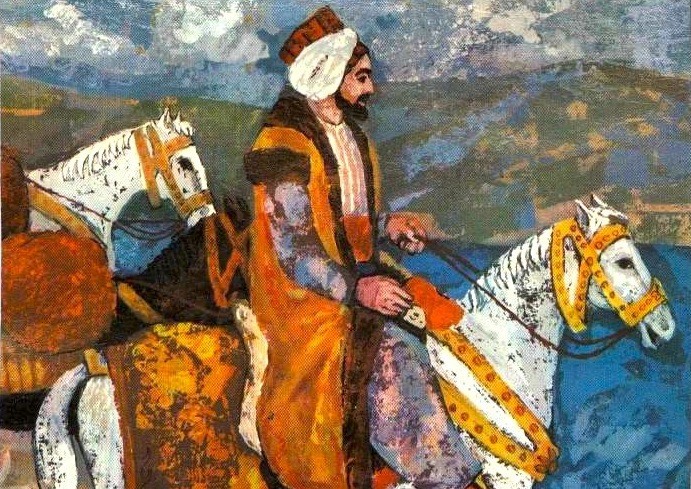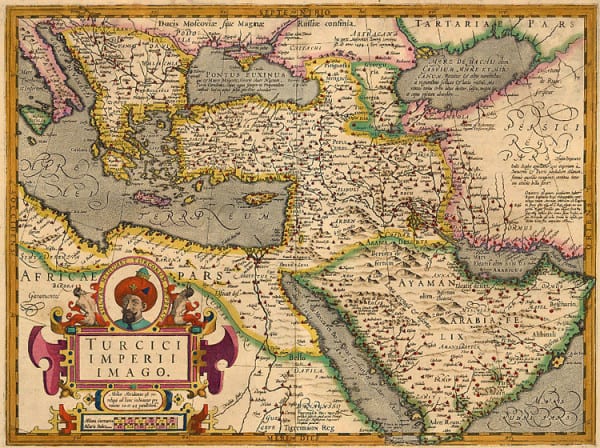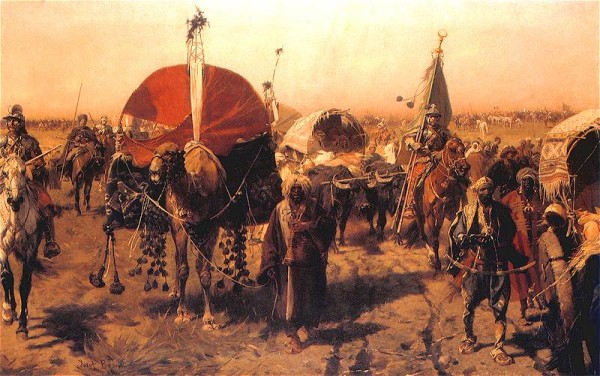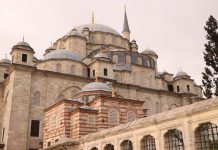These days quasi-historical shows like Game of Thrones are the most watched (and pirated) shows on TV. Also, Muhteşem Yüzyıl, “The Magnificent Century”, a prime-time soap opera depicting turmoil and intrigue in the court of Suleiman the Magnificent has been the most popular TV series of all time here in Turkey. So, why is there no TV show about Evliya Çelebi? Who was Evliya Çelebi, you ask? Let me tell you: He was only the most interesting Ottoman figure that ever lived.
Born in Istanbul in 1611, Evliya was the son of the Sublime Porte goldsmith and a woman from the Caucasus. At age 20 he had a dream in which he speaks with the Prophet Mohammed. He accidently makes a slip-of-the-tongue; intending to ask the Prophet for şefaat, meaning “intercession”, he asks him for seyahat, meaning “travel.” The Prophet smiles and blesses his future journeys.

Evliya Çelebi traversed The Ottoman Empire and beyond for over 40 years. He mingled with military figures and heads of state. He sailed down the Nile, performed the pilgrimage to Mecca, and visited the Caucasus, Iran and many other countries. He was a raconteur, dervish, musician, müezzin and linguist. A bon vivant renowned for his wit, Evliya has been compared to both Shakespeare and Marco Polo. Still Not convinced? What if I told you his adventures were enough to fill 10 large volumes? This massive travelogue is entitled the Seyahatname, or “The Book of Travels.” Dope title for the TV show, right?
So, allow me to pitch “Book of Travels” the TV series.
Evliya’s style of writing was unconventional and often highly exaggerated, so, the TV show could be both wildly imaginative and darkly realistic. The show could mix real historical figures with other made-up characters. Through the eyes of this daredevil traveler, the show would illustrate the lives and customs of a wide variety of people all across the 17th-century world.
We follow Evliya as he attaches himself to various pashas sent to all parts of The Ottoman Empire and beyond. He serves them as secretary, müezzin, messenger, courier and, most importantly, as musahip (a bon companion and confidant). This TV series explores many topics such as the concept of home, freedom, nostalgia, cultural encounters and the dangers of being connected to those in power.
Pilot: Istanbul, 1620. A young Evliya sketches a panorama of the city, which, he explores with his relative Melek Ahmed. He spends his youth reading and learning Greek and Latin. He reads and memorizes the Koran but doesn’t take religion terribly seriously. His Koranic skill catches the attention of Sultan Murad IV, who invites him to court. He becomes close to the sultan and experiences the opulence and luxury of the life in the palace. He even witnesses Hezârfen Ahmed Çelebi flying over the Bosporus with artificial wings. This is what inspires Evliya to dream about freedom and travel. On his 20th birthday, he has the dream in which the Prophet himself blesses his travel aspirations. Just before Evliya’s 30th birthday, Sultan Murad IV dies. There is a conspiracy among Murad’s successors to try to kill Evliya. He barely escapes Istanbul with his life. He looks back at the city from the distance and sets out on his travels.

Season One: A young Evliya meets Ketenci Ömer Pasha, who has been appointed governor of Trabzon, and joins him in a military campaign in Crimea. He has many adventures include being shipwrecked in the Black Sea and taking refuge from a snowstorm in a robber’s den. He returns to Istanbul and meets Defterdarzade Mehmed Pasha, a kinsman appointed governor of Erzurum. Evliya joins him as his chief müezzin and musahip. Once in Erzurum, the pasha sends him to Tabriz in Iran and Evliya tours Azerbaijan, Armenia and Georgia where he has many adventures.
Season Two: Defterdarzade is removed from his post. At the same time, Varvar Ali Pasha, the discharged governor of Sivas, rebels against the mad excesses of the Sultan Ibrahim and his grand vizier Ipshir Pasha. Varvar makes an alliance with Defterdarzade, who raises a private army. Evliya serves as a messenger and travels from village to village recruiting and training troops. They march toward Istanbul but are defeated in an ambush by Ipshir Pasha. It turns out that this vizier is also Evliya’s kinsman. In fact, Ipshir has a soft spot for Evliya. So, the vizier beheads Varvar, but spares Defterdarzade upon Evliya’s intercession.
Getting news of his father’s death, Evliya returns to Istanbul. While he mourns his father, he witnesses the overthrow of Sultan Ibrahim, the ascension of Sultan Mehmed IV and the janissary revolt. Evliya attaches himself to another kinsman, his friend Melek Ahmed, and they depart to fight against the rebellious Khan of Bitlis.

Season Three: Evliya and Melek try to negotiate peace with the Khan of Bitlis, an unstable man whose personality wavers between genius and bloodthirsty killer. Evliya witnesses the murder of one of the khan’s sons by his own brother and has to quickly escape across the snowy mountains of eastern Anatolia.
He then joins the Polish campaign against the prince of Transylvania and witnesses the Cossack siege of the fortress of Azov. Melek suffers the death of his beloved wife, Kaya Sultan. To keep him away from Istanbul, the sultan appoints Melek governor of Bosnia. However, Evliya has a falling-out with a soldier close to his friend and enters the service of Grand Vizier Köprülü Mehmed Pasha instead of following Melek. He joins the pasha and the sultan in their suppression of Celali rebels in western Anatolia.
Season Four: Evliya arrives to Crimean Khanate and fights alongside the Ottoman army in the Transylvanian campaign. He then joins Melek in Sarajevo. Melek sends him on a mission to Split in order to ransom a Turkish prisoner from the violent Ban of Herzegovina. Melek is recalled to Istanbul in order to marry the aging Fatma Sultan, daughter of Sultan Ahmed I. Both parties are forced into the marriage, so it’s an unhappy one. Melek dies only months after marrying Fatma Sultan.
Season Five: Patronless, Evliya joins the Tartar army under the control of the Crimean khans. He lives among them and is shocked to learn that the strange tribe eats human flesh. He rides off with 40,000 Tatars on a raid of western Europe and gets as far as to Amsterdam. He then attaches himself to Kara Mehmed Pasha’s embassy sent to negotiate a peace treaty in Vienna. He meets Holy Roman Emperor Leopold I and resides in his palace for some time. Then he is assigned to inspect fortresses in Transylvania and Hungary before joining a Tatar khan on a raid of Moscow.
Season Six: Evliya finally returns to Istanbul after the raiding Moscow. Six of his servants die of the plague in a single week and he suffers from serious eye infection caused by the severe cold in Russia. After just few months he has enough of Istanbul and decides to visit Greece, where he sees the Parthenon and takes part in the siege of Candia. The Ottomans are ultimately victorious and conquer Crete despite Candia’s fierce resistance. Injured, he returns home, but his wanderlust returns after only six months. He sets out across southern Anatolia looking for new adventures.
Season Seven: Fast forward to an elderly Evliya Çelebi looking out at the great pyramids and writing his memoir. In his late 50s, Evliya attempts to cross to Cyprus but is prevented by Venetian galleons. He continues overland and joins a pilgrimage caravan to Mecca. He arrives to Cairo, where the Ottoman governor Ibrahim Pasha gives him lodging and an official position. Evliya journeys along the Nile—first down to Alexandria then up as far as Sudan with side trips to Abyssinia and the Red Sea coast. He spends the last years of his life in Cairo, where he finally retires into obscurity after more than four decades of travel.
Evliya Çelebi was a charming, over-the-top man who was full of passion for discovering exotic places and cultures. However, you could also say he was just a man looking for his place in the world. I don’t know about you, but if this TV show were out there, I would be binge-watch it right now!










